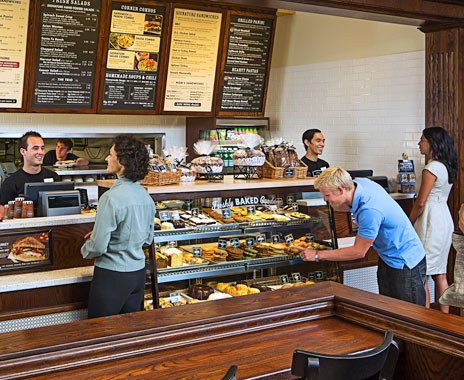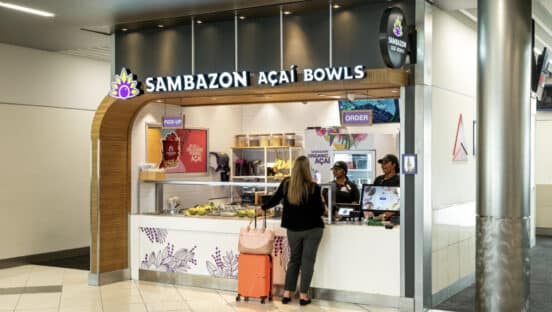Anthony Pigliacampo is like few of his predecessors in the quick-service game.
Pigliacampo is the founder of Modmarket, a Colorado-based concept that continues to earn rave reviews for its modern environment and high-quality food, and which had six stores open at the end of 2013. By the end of this year, Modmarket’s unit count will jump to 13 and then to at least 24 by the end of 2015.
What makes Pigliacampo different from his peers is that all of that growth will be through company-owned stores.
The brand’s growth strategy spotlights a rising industry shift. In years past, an ambitious concept like Modmarket would have likely embraced franchising as its growth mechanism, specifically as it traveled to new markets across the U.S. Not so for Modmarket, which, bolstered by strong unit economics and a favorable capital environment, is expanding through company-owned outlets rather than franchised stores.
“We’ve built a culture around scratch cooking and feel that might be difficult to hand over to a franchisee,” Pigliacampo says. “When we hire the people, we feel there’s stronger control of the training and execution.”
For Pigliacampo and many others in the quick-service industry, franchising is not the no-brainer decision it once seemed.
“Brands just aren’t turning to franchising as quickly as they did 10, 15, or 20 years ago,” says longtime industry observer Dennis Lombardi of Ohio-based WD Partners. “The appeal and popularity, the benefits and drawbacks of franchising have not changed, but the concepts have.”
Though franchising remains the quickest way to expand unit count and market presence with fewer financial resources—still an attractive prospect for many quick-service players—a number of emerging and even established concepts are favoring corporate-owned stores and battle-tested, multiunit franchisees to accomplish their development objectives. That reality is squeezing opportunity for single-unit entrepreneurs, long a prevalent force in the quick-service franchising universe, and changing the face of quick-service franchising.
Veteran industry analyst Jon Jameson says the market downturn was a “wake-up call” for the industry, particularly as it relates to franchising partners. As the nation’s economy surged in the early and mid-2000s, a number of growth-minded concepts were happy to hand a store to any franchisee with a check and a heartbeat—what has come to be known as the “warm body syndrome.” Though unit counts accelerated, shoddy operators peppered various quick-service systems.
When the economy began stumbling in the late 2000s, in tandem with heightened consumer expectations around product quality and the guest experience, sub-par franchisees became a noticeable drain on the entire system.
“Many of the concepts that grew for growth’s sake are wishing they hadn’t, because now they’re spending a lot of time and resources on the poor performers,” says Jameson, a founding partner with the Bellwether Food Group and a former Panera Bread executive.
Subsequently, brands have started thinking differently about development and selling franchises has taken a seat behind maintaining the brand’s marketplace integrity. The industry hasn’t necessarily soured on franchising, but it most certainly has soured on franchising rookies, the experts say.
Today, Jameson says, brands are seeking the right franchisees above all else, well aware that poor franchise partners can quickly hamper the brand’s reputation with consumers as well as its credibility with existing high-performing franchisees in the system.
“Brands are looking at growth with more strategic eyes,” Jameson says. “They realize they can’t be as good as they want to be until they get rid of the sores.”
A growing number of brands are now shunning single-store franchisees and placing their development hopes on the backs of experienced multiunit franchisees. Not only does the strategy allow brands to ditch an extensive, overwhelming franchisee network—one filled with people possessing an array of business literacy skill levels and commitment—for fewer, proven professionals, but the philosophy also allows concepts to pursue growth with franchise partners holding the track record, financial backbone, and operational wherewithal to build and develop units.
In quick-service franchising, slim is in.
“And with cost and sales pressures from the economy and increases in labor costs and the healthcare situation, this will only continue,” Jameson says.
Over the last three years, Corner Bakery Café has unleashed aggressive franchising plans. Set to reach about 200 units by the end of this year, Corner Bakery looks to add about 50 units in 2015 and 60 units in 2016. The vast majority of that growth will be driven by franchised locations run by experienced, multiunit franchisees, which Corner Bakery president Gary Price says is one way to mitigate franchising’s perils, namely unproven operators harming the system and the scattered voices of too many diverse stakeholders.
“Selecting our franchise partners is the most important decision I make,” says Price, who was hired by Roark Capital in 2011 to accelerate Corner Bakery’s franchising efforts. “We’re very selective, and have an exhaustive process about bringing franchisees on board, including vetting their current operations.”
Similarly, upstart fast-casual pizzeria Pie Five Pizza is jumpstarting its franchising operations after two years of building its corporate presence. The 19-unit concept, which now has six franchised units, has 11 franchise partners committed to building more than 150 stores in a range of markets. For Pie Five, a trendy concept entrenched in the growing fast-casual pizza category, franchising is almost a necessary competitive play, as it delivers the rapid growth the company needs to make market headway.
“Moving earlier and quicker than the others really does count,” Pie Five CEO Randy Gier says.
Much like Corner Bakery, however, Pie Five is aligning itself with established, multiunit operators possessing the community ties, industry know-how, and financial strength to develop markets.
[pagebreak]
“We’re going to partner with the right people and invest in their success off the bat, so the right culture is in place to help Pie Five and its partners thrive,” Gier says.
Though McAlister’s Deli has more stores today than it had when Frank Paci arrived as CEO three years ago, rising from about 300 to 325 stores, the company claims fewer franchisees. Paci says a number of existing franchisees purchased underperforming units from other franchisees with an eye on improving performance and advancing development.
In the next five years, McAlister’s looks to open about 25–40 units annually, a goal that would bring McAlister’s total unit count toward 500. Paci says existing franchisees will drive most of that development, though bringing new franchisees into the system, specifically ones with multiunit operational experience, will remain a priority.
“Ideally, we want to hedge our bets on franchisees who are proven operators,” he says. “As we see it, development in our system is a privilege, not a right.”
Jameson foresees many quick-service chains employing the same strategic philosophy, fueling growth with experienced operators, particularly those already in the system. In an intriguing turn, Jameson has also noticed some concepts introducing the idea of franchising to strong general managers at corporate-owned stores as an additional path to propel growth.
“And in both cases, this makes sense because these are the folks who live and breathe the brand. The track record is there,” Jameson says.
In addition to the hefty focus on proven franchisees, companies are also driving growth with corporate-owned stores, content to put franchising on the bench in an effort to maximize their own profitability. Meanwhile, a robust investor appetite for high-growth concepts, particularly compelling fast-casual brands, is pushing fresh capital into the market.
“A lot of fast-casual concepts, which are driving the industry’s growth right now, have unit-level economics and an easier path to raise capital than in past years, and that’s changing the appeal and need for franchising,” Lombardi says.
At Modmarket, for instance, Pigliacampo views franchising as a funding mechanism his upstart concept doesn’t presently need.
“We like our ROI from a company perspective, and if we can get the cash to build new units, that’s a good deal for us,” he says. “We’re growing at a pace not constrained by capital, but by operations.”
In discussing franchising’s potential, Pigliacampo and his Modmarket colleagues analyzed restaurant brands they respected, marveling at the infrastructure each developed to support franchise operations.
“Our thinking was that if we’re going to invest mounds of money in anything, we might as well do that in company-owned stores where the ROI is greater for us,” he says.
Other concepts already in the franchising game, however, champion the benefits of using corporate-store growth as just one piece of the puzzle, alongside franchised units from proven operators.
Though Corner Bakery has activated aggressive franchise development plans, the company, which didn’t begin franchising until 2007, looks to achieve a 50/50 split between franchised and company-owned stores. With a $2.3 million AUV, Price says, Corner Bakery leadership agrees that pairing new company-owned stores with franchised operations is a shrewd use of capital.
“We feel that a 50/50 split is a good mix for us,” Price says. “With company-owned stores, our franchise partners see we have skin in the game and are committed to driving the bottom line. And by having franchised units, we’re able to accelerate our growth horizon.”
Continuing to build or operate corporate-owned stores also signals to franchisees—both current and prospective—that headquarters has confidence in the brand, a sentiment that can spark added investment and development.
“Company-owned stores help us stay aligned with our franchisees. We see the same things on the P&L that they see,” McAlister’s Paci says.
Today, in fact, McAlister’s has more corporate-owned units than when Paci arrived three years ago. That includes the corporate repurchase of 13 languishing franchised units just last year. Corporate-owned stores now account for about 15 percent of McAlister’s total unit tally, a number Paci looks to maintain.
“When we bought back some poor performers, it was a positive message to others in our system that we’re doing something to improve the brand and put it on a better track, and, whether you’re talking corporate-owned stores or franchised locations, that’s the clearest path to future growth,” Paci says.
In the years ahead, Lombardi predicts, some emerging brands now committed to running company-owned stores will begin pursuing franchising as their individual circumstances evolve. Perhaps the concepts discover they cannot grow as quickly as they had hoped through internal means, new investors enter the fray eager to push strategic growth, or concepts feel their processes and systems have reached a point where they can now incorporate franchisees.
“Circumstances change strategy, which changes the appeal of franchising,” Lombardi says. “Franchising will not go away, but it will experience some repositioning from time to time.”
Though Pigliacampo does not see a day where a single entrepreneur will run one Modmarket store, he acknowledges Modmarket’s franchising potential. More than likely, however, Modmarket would follow the lead of its fast-casual brethren: continuing to open and operate company stores while partnering with experienced multiunit franchisees to develop a given market.
“As you scale, different opportunities present themselves, and we understand certain partners will be attracted to one another,” Pigliacampo says. “We’re not opposed to franchising somewhere down the line, but that’s not where we’re at now. And if we ever pull the trigger on franchising, it will be in a very strategic, thoughtful way.”







